Related Research Articles

David Howell Evans, better known as the Edge or simply Edge, is a British-Irish musician, singer, and songwriter. He is best known as the lead guitarist, keyboardist, and backing vocalist of the rock band U2. A member of the group since its inception, he has recorded 15 studio albums with them as well as one solo record. His understated style of guitar playing, a signature of U2's music, is distinguished by chiming timbres, use of rhythmic delay, drone notes, harmonics, and an extensive use of effects units.

Achtung Baby is the seventh studio album by Irish rock band U2. It was produced by Daniel Lanois and Brian Eno, and was released on 18 November 1991 on Island Records. After criticism of their 1988 release Rattle and Hum, U2 shifted their direction to incorporate influences from alternative rock, industrial music, and electronic dance music into their sound. Thematically, Achtung Baby is darker, more introspective, and at times more flippant than their previous work. The album and the subsequent multimedia-intensive Zoo TV Tour were central to the group's 1990s reinvention, by which they abandoned their earnest public image for a more lighthearted and self-deprecating one.
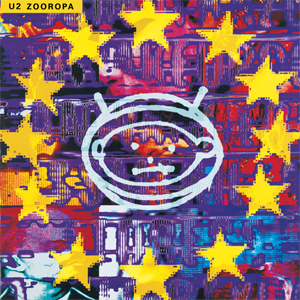
Zooropa is the eighth studio album by Irish rock band U2. Produced by Flood, Brian Eno, and the Edge, it was released on 5 July 1993 on Island Records. Inspired by the band's experiences on the Zoo TV Tour, Zooropa expanded on many of the tour's themes of technology and media oversaturation. The record was a continuation of the group's experimentation with alternative rock, electronic dance music, and electronic sound effects that began with their previous album, Achtung Baby, in 1991.
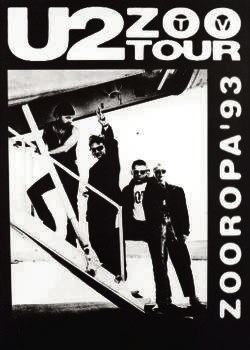
The Zoo TV Tour was a worldwide concert tour by rock band U2. Staged in support of their 1991 album Achtung Baby, the tour visited arenas and stadiums from 1992 to 1993. It was intended to mirror the group's new musical direction on Achtung Baby. In contrast to U2's austere stage setups from previous tours, the Zoo TV Tour was an elaborately staged multimedia spectacle, satirising television and media oversaturation by attempting to instill "sensory overload" in its audience. To escape their reputation for being earnest and over-serious, U2 embraced a more lighthearted and self-deprecating image on tour. Zoo TV and Achtung Baby were central to the group's 1990s reinvention.

"I Still Haven't Found What I'm Looking For" is a song by Irish rock band U2. It is the second track from their 1987 album The Joshua Tree and was released as the album's second single in May 1987. The song was a hit, becoming the band's second consecutive number-one single on the US Billboard Hot 100 while peaking at number six on the UK Singles Chart.
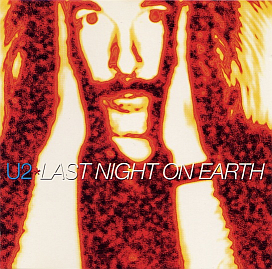
"Last Night on Earth" is a song by Irish rock band U2. It is the sixth track on their 1997 album, Pop, and was released by as its third single on 1 July 1997 by Island Records. The song features excerpts from "Trayra Boia", written by Naná Vasconcelos and Denise Milan. It's music video was directed by Richie Smyth and filmed in the US.

"Lemon" is a song by Irish rock band U2. It is the fourth track on their eighth album, Zooropa (1993), and was released as its second single in September 1993 by Island Records. Inspired by old video footage of lead vocalist Bono's late mother, the lyrics describe an attempt to preserve memory through film. More than any previous U2 song, "Lemon" showcases Bono's falsetto vocal range, aided by atmospheric backing vocals from the Edge and Brian Eno. Mark Neale directed the accompanying music video. At almost seven minutes, it is among the band's longest songs.

"Numb" is a song by Irish rock band U2. It is the third track from their eight album, Zooropa (1993), and was released in June 1993 by Island Records and PolyGram as the album's first single. The song features a monotonous mantra of "don't" commands spoken by guitarist the Edge amidst a backdrop of various sound effects and samples. The noisy composition and lyrical concept for "Numb" were inspired by the theme of sensory overload, which had prominently been incorporated into the Zoo TV Tour. Lead singer Bono and drummer Larry Mullen Jr. provided backing vocals on the track.
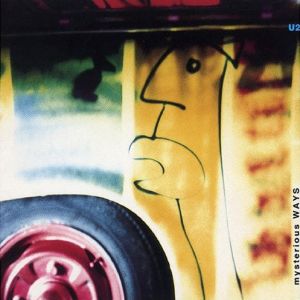
"Mysterious Ways" is a song by Irish rock band U2. It is the eighth track from their 1991 album, Achtung Baby, and was released as the album's second single on 2 December 1991. The song began as an improvisation called "Sick Puppy", with the band liking only the bass part that bassist Adam Clayton composed. The band struggled to build a song from it, with vocalist Bono and producer Daniel Lanois arguing intensely during one songwriting session. The song's breakthrough came after guitarist the Edge began experimenting with the Korg A3 effects unit. "Mysterious Ways" features a danceable beat, funky guitar hook, and conga-laden percussion, as well as mystical lyrics by Bono about romance and women.

"The Fly" is a song by Irish rock band U2. It is the seventh track from their 1991 album, Achtung Baby, and it was released as the album's first single on 21 October 1991 by Island Records. "The Fly" introduced a more abrasive-sounding U2, as the song featured danceable hip-hop beats, industrial textures, distorted vocals, and an elaborate guitar solo. Lead vocalist Bono described the song as "the sound of four men chopping down The Joshua Tree", due to its departure from the sound that had traditionally characterised the band in the 1980s.
"Zoo Station" is a song by Irish rock band U2. It is the opening track from their 1991 album Achtung Baby, a record on which the group reinvented themselves musically by incorporating influences from alternative rock, industrial, and electronic dance music. As the album's opening track, "Zoo Station" introduces the band's new sound, delivering industrial-influenced percussion and several layers of distorted guitars and vocals. Similarly, the lyrics suggest the group's new intents and anticipations. The introduction, featuring an "explosion" of percussion and a descending glissando for a guitar hook, was meant to make the listener think the album was mistakenly not U2's latest record or that their music player was broken.
"Ultraviolet (Light My Way)" is a song by Irish rock band U2. It is the tenth track from their seventh studio album Achtung Baby. Ostensibly about love and dependency, the song also lends itself to religious interpretations, with listeners finding allusions to the Book of Job and writers finding spiritual meaning in its invocation of the light spectrum.
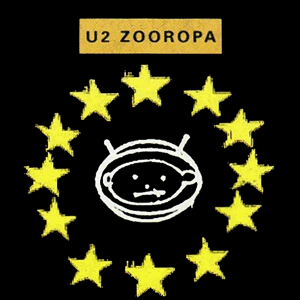
"Zooropa" is a song by Irish rock band U2, and is the opening track from their 1993 album of the same name. The song was the result of combining two pieces of music, the first of which was conceived in the studio, and the second of which was a soundcheck recording from one of the group's concert tours that was discovered by guitarist the Edge. The lyrics were written by lead vocalist Bono and describe two characters in a brightly lit city in a futuristic version of European society. Some lyrics in the song were taken directly from advertising slogans, and they also featured the phrase "dream out loud", which has appeared in other U2 media. The song touched on several themes, including moral confusion and the future of European society.

The Mystery of Life is the 77th album by country singer Johnny Cash, released in 1991, and his last for Mercury Records. The songs featured are culled from both recent sessions and from leftovers from Cash's first Mercury session in 1986 for the album Johnny Cash is Coming to Town.
"Acrobat" is a song by rock band U2, and is the eleventh track on their 1991 album Achtung Baby. The song developed from a riff created by guitarist the Edge, and is played in a 12
8 time signature. Lyrically, the song expresses themes of hypocrisy, alienation, and moral confusion. Although "Acrobat" was rehearsed prior to the third leg of the Zoo TV Tour, it had not been performed live until its debut on the Experience + Innocence Tour on 2 May 2018.

"Stay " is a song by Irish rock band U2. It is the fifth track on their eighth album, Zooropa (1993), and it was released as the album's third single on 22 November 1993 by Island Records. The song reached number one in Ireland and reached the top 10 in Australia, Iceland, the United Kingdom, and several other countries. The accompanying music video, directed by Wim Wenders, was shot in Berlin, Germany. The earliest incarnation of the song developed during sessions for the group's 1991 album Achtung Baby. It was written for and inspired by Frank Sinatra and bore his surname as the original working title. An alternative recording was used in the 1993 film Faraway, So Close!, also by Wim Wenders.
"So Cruel" is a song by rock band U2. It is the sixth track on their 1991 album Achtung Baby, concluding side one of the album. The song was written at Elsinore in Dalkey. While audio engineer Flood changed reels to listen to a demo of another song, lead singer Bono began to improvise a song on guitar. The rest of the band quickly joined in, creating the first take of the song. It was developed as an acoustic track, with Flood adding overdubs and additional elements later. Bassist Adam Clayton and Flood noted that the technology in the studio was crucial in transforming the acoustic song into the final mix.
"Daddy's Gonna Pay for Your Crashed Car" is a song by Irish rock band U2 and the sixth track from their 1993 studio album Zooropa.
"Dirty Day" is a song by Irish alternative rock band U2. It is the ninth track on their 1993 studio album Zooropa. The music was written by the band as a whole, while the lyrics were written by Bono and the Edge. The song, along with "Numb", marks the Edge's first lyrical contributions to a U2 song since "Van Dieman's Land" on 1988's Rattle and Hum and indicated his growing presence as a second lyricist in the band; he would go on to contribute lyrics to every track on the band's next album, Pop.
References
Footnotes
- ↑ Givens, Ron (9 August 1993). "Picks and Pans Review: Zooropa". People . 40 (6): 24. Retrieved 17 September 2014.
- ↑ Stockman (2005), p. 115
- ↑ Verna, Paul (12 June 1993). "U2 re-inks with Island; 9th album to bow July 6". Billboard . Vol. 105, no. 24. p. 12. ISSN 0006-2510.
- ↑ Rolling Stone (1994), p. 201
- ↑ McGee (2008), p. 158
- ↑ @U2/Calhoun (2013)
- ↑ "@U2".
- ↑ Casebeer, Tim (9 July 1993). "Zooropa". Willamette Week . Richard Meeker.
- ↑ Richey, Dettmar (1999), p. 4
- ↑ "U2's 'Zooropa' Almost Killed Their Career". 6 July 2013.
- ↑ "In a decade where U2 got weird, Zooropa was the band's weirdest effort". The A.V. Club . 9 April 2013.
Bibliography
- Dettmar, Kevin J.H.; Richey, William (1999). Reading Rock and Roll: Authenticity, Appropriation, Aesthetics . New York: Columbia University Press. ISBN 0-231-11399-4.
- McGee, Matt (2008). U2: A Diary. Omnibus Press. ISBN 978-1-84772-108-2.
- "Achtung, Babies! A New U2 Album! David Fricke, July 8–22, 1993". U2: The Rolling Stone Files. London: Sidgwick & Jackson Limited. 1994. ISBN 0-283-06239-8.